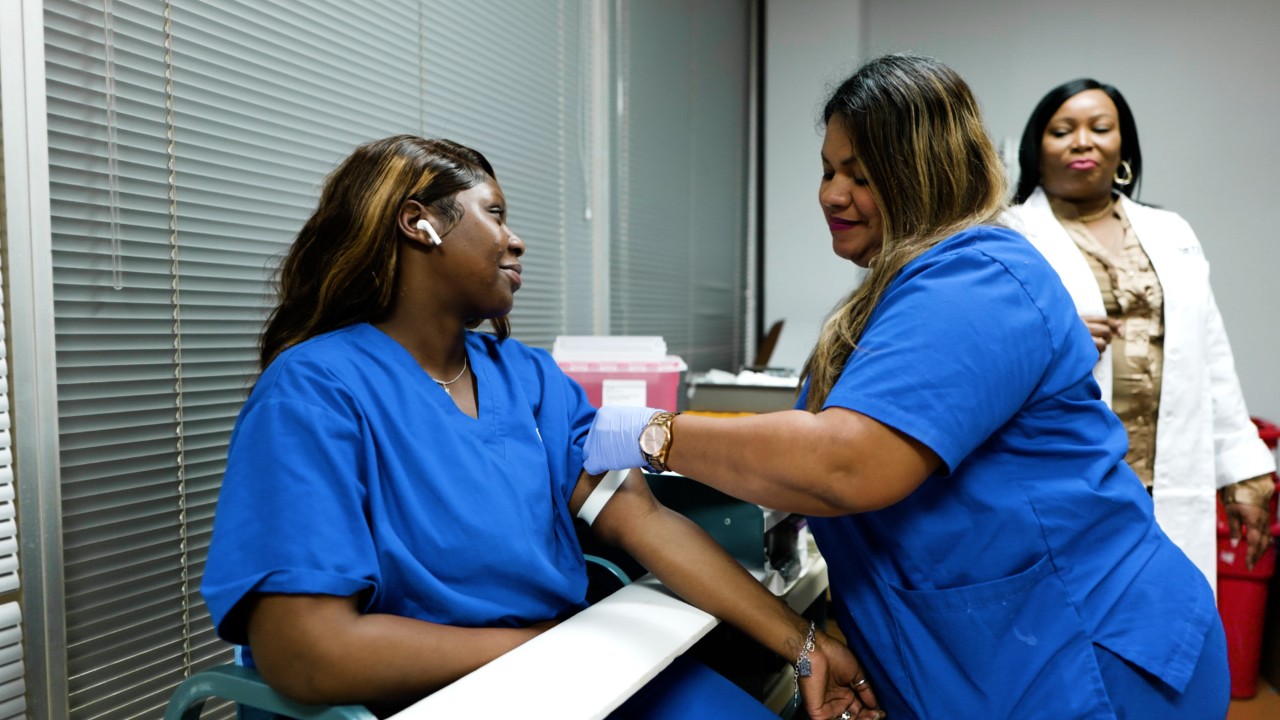As the backbone of many healthcare facilities, medical assistants play a vital and versatile role, tackling both administrative tasks and hands-on clinical duties.
On any given day, you might find a medical assistant greeting patients at the front desk, taking vital signs, drawing blood, administering injections, updating electronic health records, handling insurance and billing, and so much more. It's a dynamic role that requires a diverse medical assistant skill set encompassing communication, clinical, administrative, organizational, and problem-solving skills. An understanding of ethics and professionalism is especially important, as medical assistants often deal with sensitive patient information.
Medical assistant employment is projected to grow 14% from 2022 to 2032, exceeding the average growth rate for all occupations, according to the U.S. Bureau of Labor Statistics. Individuals can often complete their medical assistant training in under two years, making the role of medical assistant a practical entry point into the healthcare field.
6 Essential Skills for Medical Assistants
Medical assistants play an integral role within healthcare environments, requiring a versatile set of skills to manage their responsibilities effectively. The following medical assistant skills are necessary to excel in both clinical and administrative capacities in the healthcare sector.
1. Interpersonal and Communication Skills
Since medical assistants serve as the bridge between patients, doctors, and other staff, effective communication is key. They need to explain complex medical information in easy-to-understand terms, all while demonstrating empathy and building trust.
Medical assistants also need to adapt their communication styles to meet the needs of diverse patient populations, utilizing verbal explanations, visual aids, or technology to ensure clarity. Additionally, maintaining professionalism in all interactions promotes a respectful and efficient workplace environment.
2. Clinical Skills
From taking vital signs to administering injections, medical assistants perform a wide range of essential clinical tasks. Clinical tasks for medical assistants include accurately measuring blood pressure and heart rate, properly and safely administering injections and vaccinations, and handling emergencies and routine cardiac health checks through electrocardiograms and CPR.
Precision and attentiveness are essential to ensure patient safety and positive outcomes. Medical assistant skills in clinical settings also include knowing how to perform phlebotomy and lab tasks and adhering strictly to protocols to prevent contamination. Preparing patients for examinations and managing aftercare, such as applying and removing dressings, are critical, requiring thorough knowledge of wound care and infection control.
3. Administrative Skills
Medical assistants are vital in managing the administrative operations of healthcare facilities, ensuring smooth clinical and clerical processes. They are proficient in electronic health records, which are crucial for accurate patient information updates and retrieval.
In terms of administrative work, medical assistant skills may extend to medical coding and billing, which are necessary for preventing financial discrepancies and ensuring timely payments, while adhering to HIPAA regulations to maintain patient confidentiality. Additionally, they should be able to multitask, handling duties like scheduling, billing, and patient communication.
4. Organizational Skills
Organization and attention to detail are paramount to ensure quality patient care. These skills are crucial for managing and updating detailed patient records. Organizational responsibilities include managing supplies, coordinating appointments, and meticulous record keeping.
Regular self-assessment allows medical assistants to recognize and correct discrepancies in their work, uncover opportunities to advance their medical assistant skills, and promote high standards in maintaining effective patient care.
5. Adaptability and Problem-Solving Skills
Medical assistants must be able to think on their feet, stay calm under pressure, and devise creative solutions. They must demonstrate adaptability, as their responsibilities often switch from clinical duties like taking vital signs to administrative tasks such as updating patient records.
Keeping up with technological advances and changing regulations is also essential. Medical assistants must quickly identify and solve issues, from unexpected patient reactions to scheduling conflicts, and adhere to ethical guidelines to navigate complex situations.
6. Professionalism and Ethics
Professionalism and ethics are fundamental for prioritizing patient-centric care. Medical assistants are entrusted with sensitive patient information and the well-being of vulnerable individuals. Upholding the highest standards of ethics and integrity is nonnegotiable.
Medical assistants are guided by codes of ethics from organizations like the American Association of Medical Assistants (AAMA) and the National Center for Competency Testing (NCCT). These codes stress the importance of respecting patient privacy, managing conflicts of interest by prioritizing patient welfare, and engaging in community health activities.
Benefits of Medical Assistant Training
Enrolling in a medical assistant training program provides the essential education and hands-on medical assistant skills needed for effective performance in diverse settings, including hospitals and private clinics.
The internship opportunities included in some programs offer valuable real-world experience and professional networking, which are important components of a successful healthcare career. Additionally, these programs prepare students for nationally recognized certifications like the Certified Medical Assistant (CMA), Registered Medical Assistant (RMA), and National Certified Medical Assistant (NCMA) credentials, which are accredited by the National Commission for Certifying Agencies (NCCA).
Prepare for a Career as a Medical Assistant
Medical assistants make a tangible difference in people's lives working alongside other dedicated healthcare professionals, making this career path an incredibly rewarding one.
By enrolling in a Medical Assistant training program at Fortis, students learn to perform compassionate patient care and manage crucial administrative tasks, and they can apply their training across a broad spectrum of healthcare settings, from private clinics to residential care facilities. Fortis campuses, conveniently located across the country, provide in-depth training that can prepare graduates for entry-level positions, equipping them with the necessary skills to thrive in the medical field.
Discover what the Medical Assistant training program at Fortis has to offer.
Recommended Readings
Best Places to Work as a Medical Assistant
3 Good Reasons You Should Consider a Career in Medical Assisting
How Do I Know if Medical Assisting is the Right Career for Me?


